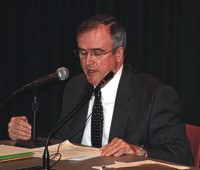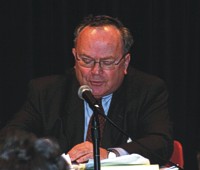
Veteran Chicago Police officer Terry Hodges instructs activists at the “Law and Order” Seminar on dealing effectively with police [Photo by EJS]
The Pro-Life Action League often fields calls from activists who want to know exactly what their rights are—activists who have perhaps been confronted by a police officer who tells them to “keep moving” as they are protesting at an abortion clinic, or have been told they could not hold graphic signs on a sidewalk. Julie McCreevy, the director of the League’s Helpers of God’s Precious Infants division, came up with the concept of holding a “Law and Order” seminar to take a comprehensive look at just what the rights of pro-life activists are.
We invited our attorney, Tom Brejcha, chief counsel of the Thomas More Society Pro-Life Law Center, and Terry Hodges, a retired Chicago police officer who currently teaches political science at two Chicago colleges, to spend an afternoon with activists, discussing our basic constitutional rights and the issues surrounding pro-life activities.
Starting off with a recording of the well-known theme song from the television series Law and Order, Ann Scheidler acted as moderator for the afternoon seminar. Drawing on his thirty years on the Chicago Police force, Terry Hodges presented a detailed picture of the police officer’s role. He told the audience of fifty people that first and foremost the police officer is taught that the First Amendment of the United States Constitution is the most important law of the land, and that all other laws, whether passed by Congress or by state or local law-making bodies, must not infringe upon the civil liberties guaranteed by the First Amendment. Law enforcement personnel take an oath, just like the president and members of Congress, to uphold the U.S. Constitution.
Police Are Required To Remain Neutral
That being said, however, Hodges pointed out that police officers have an enormous amount of discretion at the street level, since they are also commissioned to keep the peace and safeguard the public. He assured the activists that police officers, especially in a large city like Chicago, try to do their best to protect the rights of everyone involved in a demonstration. “The police do not take orders from the abortion mills,” he said. “They don’t take orders from you.” The police are expected to be neutral. Reading from the Chicago Police Department directives, Hodges listed several advisories for police officers investigating a First Amendment activity.
Typically, Hodges explained, if the police are called to an abortion clinic by the clinic personnel, they will take a few minutes to observe the situation before getting out of the squad car and going into the clinic. The officer will take information first from the individual who placed the call—in this case a clinic staff member. He will then speak to the pro-lifers and get their side of the situation. If the clinic has complained that pro-lifers are blocking the driveway into the clinic, he will question them, and perhaps remind them that blocking the entrance is prohibited. He is unlikely to make an arrest based solely on the word of a clinic employee or a pro-lifer. But he will make a report to document that he has assessed the situation. Both parties are entitled to get the number of the report in case they need it later.
Hodges also assured the audience that the last thing a police officer wants to do is put pen to paper and make an arrest, because it is much more work for him. But if either the clinic operator or the protester want to pursue having an arrest warrant issued, the individual should ask the officer where he or she should go to obtain a warrant and should ask the officer for the report number. The police ideally want to resolve a situation without an arrest.
Respect Is Key When Dealing with Police
Mr. Hodges advised that pro-lifers should always address an officer respectfully, using his or her title, “officer,” “sergeant,” and so forth. And he advised that even if you suspect the police officer is misinformed or misinterpreting the law, it is best to go along with what he tells you, and make a complaint or talk to a lawyer at a later time. Never, he said, should you tell an officer that you want to speak to his superior officer. If you want to go up the chain of command, get on your own phone and call for a superior to come to the scene.

Attorney Tom Brejcha explains how pro-life activists can defend their rights [Photo by EJS]
Tom Brejcha, the lead attorney in the NOW v. Scheidler RICO case, told the audience that as a result of the recent unanimous victory in the United States Supreme Court in NOW v. Scheidler, pro-lifers no longer need be concerned that they could be hit with a RICO lawsuit.
Mr. Brejcha read from the text of the FACE bill (Freedom of Access to Clinic Entrances), passed in 1994, that one cannot “by force, or threat of force, or physical obstruction injure, intimidate or interfere” with someone because she is trying to get into an abortion clinic. The bill includes a section defining terms such as “intimidate,” limiting what seems like the broad scope of the bill.
Brejcha concurred with Hodges that protesters and sidewalk counselors are well-advised to do what they are told by police officers, then contact a lawyer to do further research into what the law or ordinance in a given town actually says. He said he has generally been successful in pointing out how a regulation has been misapplied, or in having an unconstitutional ordinance struck down.
Both law and order experts were emphatic that the usual activities of pro-life activists are classic First Amendment protected activity—freedom of speech, freedom of religious expression, freedom of assembly. Although they advised prudence, they also sought to impart to their audience the confidence to boldly pursue their pro-life activities.
Audio CDs of the seminar are available by calling the Pro-Life Action League at 773-777-2900.
